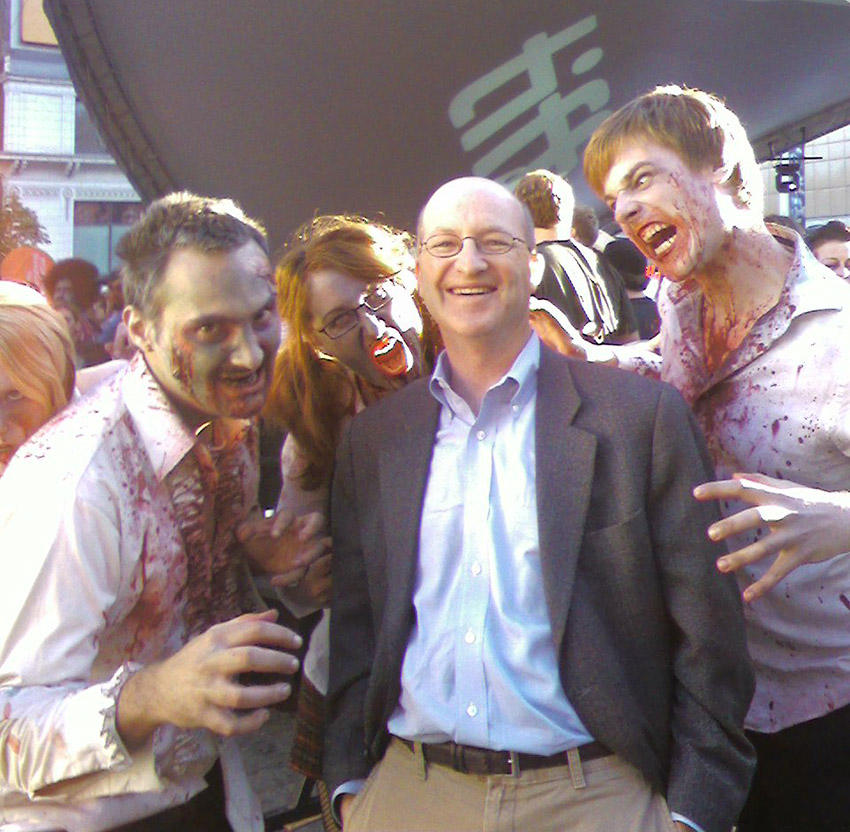A Conversation With Mass General’s ‘Zombie Doctor,’ Steven Schlozman

Schlozman with zombies. Photo provided to bostonmagazine.com
In many ways, Massachusetts General Hospital’s Steven Schlozman is just like any child psychiatrist. Except, of course, for the fact that he’s known as “The Zombie Doctor.”
Schlozman is the author of The Zombie Autopsies, a novel about curing zombies that, while fictional, actually incorporates real neurobiological information. “I wrote a fake medical paper on what would be wrong with the brain of a zombie, and then I just sent it around to some people and it went viral,” he says. “I eventually got contacted by a publisher who asked, ‘Would you write us a novel?'”
Today, Schlozman’s book remains a cult favorite among zombie lovers, and he’s expanded his resumé to include teaching a class on horror films at Harvard. As Halloween approaches, we asked Schlozman about his passion for zombies, why horror films make us tick, and what he thinks of The Walking Dead.
Why are people so fascinated with zombies and horror?
A movie that was only about zombies would be really boring—they’d just bump into each other because they can’t do much. [The movies are] more about how humans screw up, how when we get frightened we act in rash and dumb ways, and if we can keep our heads, actually, there’s a lot of problems we can solve much more easily than if we don’t. It seems obvious, and yet every zombie movie, once you’ve bought into the conceit, feels believable. I think there’s that cautionary tale aspect of good horror. Horror in general, I think, appeals to people because you get to worry about the anxieties of the world in displacement, in a way that’s just not going to happen.
What kind of person likes horror movies?
If you look at people who like horror films, first of all, they’re scared. People who go to a horror film and say, ‘That wasn’t such a big deal,’ they actually tend not to like scary movies. Horror fans must prefer to see these things in the theater or in groups. It’s this communal experience.
But what’s enjoyable about being scared?
There’s this process called meta-emotions and meta-cognition, which is not just being afraid, it’s thinking about why you’re afraid. It’s not just enjoying being afraid; it’s enjoying thinking about what made you frightened. We recognize things based on certain cues that our brains have learned to recognize and categorize, and if you change those things just a little bit, your brain recognizes it’s off well before you can understand why it’s off. A beagle is cute and a cat is cute, but a beagle with cat eyes is not cute—it’s creepy. You would recognize it’s creepy before you knew why you knew it was creepy. This cognitive task of saying, ‘What’s creepy about that?,’ that’s really enjoyable. That’s a puzzle that we get to solve.
Is there a physiological process happening in the brain when people watch scary movies?
There’s this whole literature on endorphin and dopamine reward systems that get triggered in high fight-or-flight states. When it fires, it looks like there’s a reward response in your brain that feels good. It’s that back and forth that our brains seem to enjoy. For some people—not everybody. People who are wired for it love it. My guess is it’s something in our biological makeup.
What are your favorite horror movies?
Oh, gosh. This is so hard, there’s so many. [Editor’s note: His final list was It Follows, Babadook, Dawn of the Dead, The Wicker Man, and Rosemary’s Baby.]
So what do you think of The Walking Dead?
I like it. I think it was good in the beginning, and then it got not-so-good, and then I think it slowly got good again. I think there’s probably a subset of people who just like watching them kill zombies, but…these are very violent story lines, and yet these are people telling us what not to do.
This interview has been edited and condensed.


